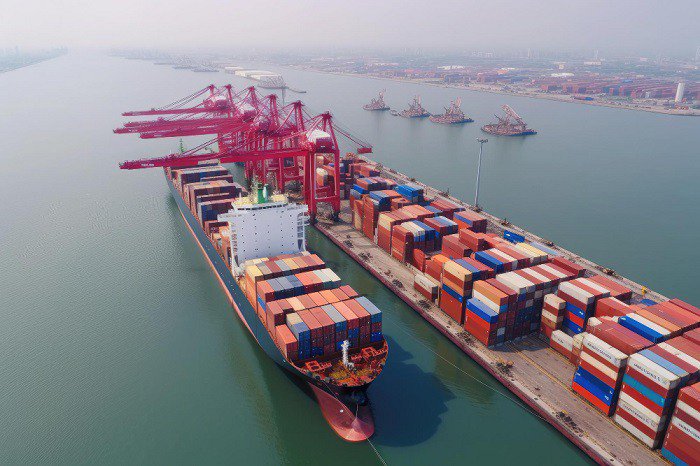
The logistics sector is essential to today's quick-paced world because it ensures the smooth transnational movement of goods and services. Business operations have been revolutionized by the introduction of technology into the logistics industry, allowing companies to overcome obstacles and improve their workflows more easily.
Thanks to the successful marriage of logistics and technology, technology has unquestionably benefited the industry, which has led to previously unheard-of growth and efficiency.
10 Ways Technology is a Boon For The Logistics And Shipping Industry
Automation And Efficiency
Automating processes in the logistics sector is one of the most important advantages of technology. Automation reduces human error and streamlines processes, increasing productivity and lowering expenses. Advanced robotics and automated warehouse systems can manage inventory, sort, and package items accurately and quickly. Automation ensures that repetitive, time-consuming tasks are finished quickly, freeing up human resources for more strategic and complex tasks.
Real-time Tracking And Visibility
Technology has made logistics a more transparent and traceable process. Businesses can track their shipments in real-time by introducing GPS, RFID (Radio-Frequency Identification), and IoT (Internet of Things) devices. This real-time tracking gives businesses precise knowledge of the location, temperature, and condition of the goods, enabling them to manage delays, make educated decisions, and give customers precise delivery estimates.
This openness improves customer satisfaction and fosters confidence in the logistics network.
Route Optimization
The logistics industry's approach to route planning and optimization has been transformed by technology. The most effective routes are determined by sophisticated algorithms that consider a variety of variables, including traffic conditions, weather predictions, delivery deadlines, and vehicle capacities.
This optimization reduces fuel use, transit times, and transportation costs. Route optimization also improves sustainability by cutting down on the carbon footprint that comes with transportation.
Data Analytics And Predictive Insights
A huge amount of data is produced every day by the logistics sector. Businesses can use technology to harness this data and gain insightful information. Modern data analytics tools offer useful data on customer preferences, demand trends, and operational bottlenecks.
Thanks to predictive analytics, businesses can predict future trends, spot potential supply chain disruptions, and modify their strategies as necessary. These perceptions support taking advantage of new opportunities, lowering risks, and making well-informed decisions.
E-commerce And Last-Mile Delivery
The logistics landscape has changed as a result of the growth of e-commerce. Technology has enabled companies to efficiently handle the difficult last-mile delivery process, which entails bringing goods to customers' doorsteps. Technology enables delivery route optimization, real-time tracking, and even cutting-edge technologies like drone and autonomous vehicle delivery options. This has not only cut delivery times in half, but it has also made it possible to reach clients in far-flung places in new ways.
Warehouse Management Systems (WMS)
Technology-driven Warehouse Management Systems play a significant role in modern warehouses. These systems make order processing, inventory management, and warehouse organization more effective.
WMS ensures accurate stock levels, lowers overstocking and stockouts, and boosts overall warehouse productivity with features like barcode scanning, RFID tracking, and integration with other systems.
Risk Management And Security
The logistics industry's risk management and security procedures have been improved by technology. IoT sensors can monitor environmental factors like humidity, temperature, and vibration to ensure that goods are transported in the best possible condition. Cutting-edge security measures like biometric authentication and tamper-proof seals protect shipments from theft and unauthorized access.
Blockchain technology is also being investigated for its potential to produce transparent and unchangeable records of the entire supply chain, improving traceability and lowering the risk of fraud.
Sustainability And Green Logistics
The use of resources and emissions associated with transportation make the logistics sector significantly worse for the environment. To encourage sustainability within the industry, technology is essential. Alternative fuels and electric and hybrid vehicles are being adopted to cut carbon emissions.
Optimizing your route and condensing your load also help you use less fuel. Technology also makes recycling and reusing packaging materials possible, which cuts down on waste.
Global Connectivity And Collaboration
The logistics sector has been transformed by technology into a global network of connected companies. Platforms and software built on the cloud enable seamless cross-border collaboration between stakeholders. This connectivity facilitates better coordination between producers, suppliers, carriers, and clients, enhances communication, and speeds up documentation processes. The entire supply chain becomes more adaptable and receptive to shifting market demands.
Adapting to Changing Consumer Behavior
Consumer demands for delivery services have changed over time, and they now expect them to be quicker, more dependable, and transparent. Logistics companies can effectively meet these demands thanks to technology.
Predicting consumer preferences and maximizing inventory levels are made possible by combining artificial intelligence (AI) and machine learning (ML). Using chatbots and automated customer service systems also improves communication and provides prompt answers to inquiries.
Conclusion
The union of technology and the logistics sector has ushered in a new era of effectiveness, openness, and innovation. Technology has revolutionized all facets of logistics operations, from automation and real-time tracking to data analytics and sustainability initiatives. The logistics industry will gain even more from technological developments as they advance, ultimately ensuring a smooth flow of goods and services worldwide. Future possibilities are exciting as new technologies like artificial intelligence (AI), blockchain, and autonomous vehicles reshape the logistics industry and make it more connected, efficient, and sustainable than ever.





 Get instant quote
and compare offers in real time
Get instant quote
and compare offers in real time